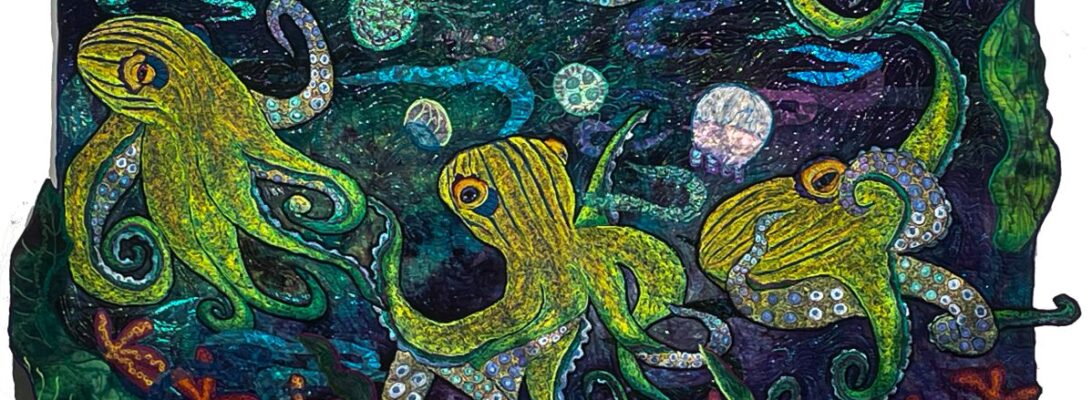
Most of the time when I applique fabric, I use a fusible like Steam a Seam 2 and I cut out my shapes. Except when I don’t.
Cut out applique works well for smaller, stable pieces that can be cut and moved around. Cut-away applique is better for elegant curved lines you just can’t cut out and move around..They shim out of shape too easily. And then they never lie flat.
Direct Applique
- Attach a layer of fusible to the applique
- Cut out the object before you glue
- Stitch down free motion zigzag
- 1 step process, just stitch it on
- Thicker lines
Cut- away Applique
- No fusible glue
- Lay down a sheet of applique fabric
- Straigh stitch in the design on top
- Cut it away excess fabric
- Stitch it down free motion zigzag
- 2 step process
- Softer, smoother lines
For this frog, I wanted a sinuous curved vine with curlicue tendrils. Not something that is easily done in direct applique. Larger cut-away applications can distort a bit. If we put a layer of the applique fabric over the top, stitch it down and cut it away, it’s a much cleaner, smoother line.

In cut-away applique, we stitch the design on an extra layer, and then cut-away what the excess.

Then we stitch down the edge with a free-motion zigzag stitch that can be smooth and lyrical like the design itself.

Here is the cutout vine ready for applique. What has changed? I used to draw and cut the leaves as well. I’ve done those separately to avoid some of the distortion.
Cut-away applique with Lace

The same process works with these lace butterflies. Rather than glue them on, and have the glue show through, I stitched around them straight stitch and then cut away the excess fabric. I had though I was adding butterflies, but I think they look more like the shadows of butterflies, which is much more cool.

Cut-away works as well with lace. These butterflies were part of a lace fabric. I stitched down the leaves and bugs, cut away the background, and stitched down the lace with a small free-motion zigzag stitch.

These techniques are neither right or wrong. It’s about using different techniques to get the results you want. It’s all a part of your tool box, for you to use as you want.



